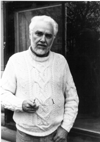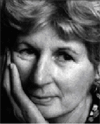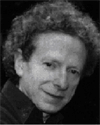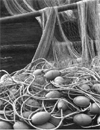 Robert Kroetsch
Robert Kroetsch
Completed Field Notes, is Robert Kroetsch's continuing poem, started in 1973, with his "Stone Hammer Poems" (Oolichan Books, 1975). Considered, in essays and reviews, to be one of the most important written of so many other times and ways, this is poetry that shows a body how it is done. It is impressive for the range of styles Kroetsch works with as well: in the extended piece(s), from note taking, letter writing, ledgers, each recording and making a record of what has happened, out in the Field, standing, out in the field, out-standing.
In his poetry so far, which is pretty much covered in the new volume of Completed Field Notes, Kroetsch keeps the geographic and thematic continuities of the poem(s) going, starting at the beginning and moving out, from the author/narrator's locale to the beyond, with one foot still on Alberta soil. Of the first collection, only the "Stone Hammer Poem" remains as prologue to the current volume¨"This stone / became a hammer / of stone, this maul / is the colour / of bone (no, / bone is the colour / of this stone maul)." (p 3). Well known in circles literary and critical, the Field Notes, Completed or otherwise, have been around for years, but out of print, from the first edition of Completed Field Notes, published by McClelland & Stewart in 1989, or earlier editions, such as "Field Notes" (General Publishing, 1981) and "Advice to My Friends" (Stoddart, 1985). It's nearly a long-running joke, somewhere, that this poem is about as 'completed' as Book 6 ended bpNichol's The Martyrology, a poem as long as a life, with new sections seeping through into the world as chapbooks and journal selections, over the years. Really, these works have possibly appeared in more single author forms than almost anything else in Canadian poetry, each time with another section or as, added.
 Daphne Marllat
Daphne Marllat
This attractive new second edition, published by University of Alberta Press through their "(currents)", an interdisciplinary series, also includes two previous Kroetsch reissues, "What The Crow Said", and "The Words of My Roaring", as well as a forthcoming new edition of Dennis Cooley's "Bloody Jack". Knowing this, part of the importance of this volume becomes what is left out in two hundred and fifty pages of Notes, from the previous edition, long disappeared from bookstore shelves, and never available second-hand. This version contains only rumours of new sections; these were not included¨the poems Fred Wah waited for, in his brilliant introduction (alone worth the price of admission), near the end: "I waited for these additions to the edition. "He intended to include them, he told me when we me in the folds of the foothills last fall. I believed him but they never showed up..." What about the limited edition chapbook you can only find on an island? Is the ongoing hush a clue?" (p XVI). From an island, as Wah says, came the long poem "The New World And Finding It" (Mother Tongue Press, 1999), originally published in an Australian magazine (One Island), and then as a chapbook, On Saltspring. Is that what Wah refers to? One can only presume. Or ask.
 Robert Minden
Robert Minden
Kroetsch's poetry, his Field Notes, Completed or Completing, is concerned with visioning and revisioning, seeing the world around him and its shifting perspectives, in a constant re-evaluation. Kroetsch the Field reporter, looking without or within. As he writes from his limited edition chapbook, "The violation begins with the naming. We say the tree is a tree. / It resists its diminishment by coming into blossom. The stone blossoms in the garden./ The garden is the violent undoing of the name." (unpaginated). Is it a violation to claim that this is Completed? Is this a precursor, a teaser, for the new poetry collection out later this year, or something further, continued Field Notes? This summer sees another University of Alberta release, The Hornbooks of Rita K., poetry within a fiction, with the fictional archivist Raymond sitting as collector and questioner of a pseudonymous (and lost) poet and her work (found). Is this another clue for us to follow, or a whole other direction? Where do the two long poems, published as chapbooks¨"The New World And Finding It" and "Revisions of Letters Already Sent" (DisOrientation Chapbooks, 1993)¨fit in? A joke is being told, somewhere. Will I argue for the continuation of the Field Notes, only to have Kroetsch read what I have written, and decide to never reprint them, sly smile on his face? "I AM A SIMPLE POET / I wrote in the dust / on the police car hood." (p 118), Kroetsch writes, in "Mile Zero", believing and belying his own confoundings. Like George Bowering's poetry, nothing is as simple as it appears¨the joke fuses with the serious work of the poem¨but somehow gives itself away with the title itself, the work, and the quiet continuation of it. When Robert Kroetsch tells you he's not writing poems, or never will again, that's when you know he's about to start.
 Gill Net, 1973
Gill Net, 1973
In two collections, one new and one reissued in a new edition, Vancouver poet Daphne Marlatt's work takes on life as a series of small recordings, concerned with sensual things, with the language of the body, and a body of language: "words incessant as rain fall hear what slips / between this tea we bring to our different lips, this space where nouns unfold" ("This Tremour Love Is", p 13, "bachi"). With two impressive spring poetry titles, Marlatt concerns herself with history and looking back. A third edition, "Steveston" (Ronsdale Press, 2001), includes new work by both author and photographer, and "This Tremour Love Is" (Talonbooks, 2001), a collection of poems called "a memory book", reworks twenty-five years of love poems. Steveston, originally published by Talonbooks in 1974, and reissued by Longspoon Press in 1984, is a record of a dying fishing village at the mouth of the Fraser River, and its predominantly Japanese population, by the poet Marlatt and photographer Robert Minden. For the new edition, both have revisited the work, with a new piece by Marlatt, "generation, generations at the mouth" (p 61-2), and nine new photographs from the same sessions as the originals, as well as four expanded prints and an afterward by Minden.
In generations: "what is the mouth of the river now? a toxic O of emptiness? teeming hole of / ever-becoming we create?" ( p 62). I've always admired what Marlatt can do with the longer line and prose that flows liquid down the page, revisiting "the still lake of our muddy and / intermingled present" (p 36). In "This Tremour Love Is", Marlatt again shows herself to be a good listener, to the sweet and gentle cadences of loss, love, longing and small tender joys: "her hands, when I saw her dead, were half curled like those of a child asleep" (p 16, "hands on the table"). Marlatt has always been one of our most powerful postmodern poets, able to say so much quietly, there, or just under the surface, as in the poem "listen"¨"but he was reading to her about loss, excited, because someone had named it at / last, was naming even as he read, the shape of what he felt to be his own, / recognized at last in words coming through him from the page" (p 24). The series "small print" (p 53-65) is an exercise in craft, a series of small, carved porcelain figures in print¨"as you ascend out of the / limits of love a joy you wished language written / in quick gesture bold stride new reference I / try to deceipher" (p 57, "v"). This isn't the first time Marlatt has gone back into her own work, seeming to make a habit of it, such as the collection "Salvage" (Red Deer College Press, 1991), going back through "Steveston" & "Vancouver Poems", or "What Matters: Writing 1968-70" (Coach House Press, 1980), which revisited journal entries and other writings made before and during her son's birth and her marital distress. In all of these, Marlatt is our poet of the heart, documenting movements and missives like no one else can, conveying the painstaking minutiae of process, thought and feeling. ˛